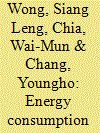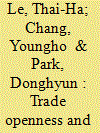|
|
|
Sort Order |
|
|
|
Items / Page
|
|
|
|
|
|
|
| Srl | Item |
| 1 |
ID:
125874


|
|
|
|
|
| Publication |
2013.
|
| Summary/Abstract |
We estimate the short-run and long-run elasticities of various types of energy consumption and energy R&D to changes in oil prices and income of the 20 OECD countries over the period of 1980-2010 using the Nerlove partial adjustment model (NPAM). We find negative income elasticity for coal consumption but positive income elasticity for oil and gas consumption suggesting the importance of economic growth in encouraging the usage of cleaner energy from coal to oil and gas. By introducing time dummies into the regressions, we show that climatic mitigation policies are able to promote the usage of cleaner energies. Through the dynamic linkages between energy consumption and energy R&D, we find that fossil fuel consumption promotes fossil fuel R&D and fossil fuel R&D in turn drives its own consumption. Renewable energy R&D which is more responsive to economic growth reduces fossil fuel consumption and hence fossil fuel R&D.
|
|
|
|
|
|
|
|
|
|
|
|
|
|
|
|
| 2 |
ID:
150814


|
|
|
|
|
| Summary/Abstract |
We investigate energy security of the Association of Southeast Asian Nations (ASEAN) under the 4-A’s framework. The ASEAN Economic Community (AEC) agreement launched in 2015 renewed a regional focus on energy security and sustainability. We employ an analytic framework to quantitatively assess progress in different categories including availability, acceptability, affordability, and applicability. Key metrics include the documentation of CO2 emissions, energy access measures, and energy supply reserves from 2005–2010. We identify relevant energy indicators using high quality historical data from the IEA and World Bank. We find that ASEAN made little progress toward establishing energy security in the previous five-year planning period (2005–2010) as it regressed in most categories except applicability. Therefore, we suggest that increased development of renewable energy and energy efficiency technologies would move ASEAN in a positive direction toward achieving energy security and sustainable energy policy goals.
|
|
|
|
|
|
|
|
|
|
|
|
|
|
|
|
| 3 |
ID:
128406


|
|
|
|
|
| Publication |
2014.
|
| Summary/Abstract |
This study aims to examine how China's energy security has changed over 30 years of reform and the opening period. It constructs a 4-As quantitative evaluation framework-the availability of energy resources, the applicability of technology, the acceptability by society, and the affordability of energy resources. The quantitative results show that China's energy security was at its best during the sixth FYP period (1981-1985), but then deteriorated until it hit higher levels between 1995 and 2005. However, it was still lower than the level reached during the sixth FYP period. During the eleventh FYP period (2006-2010), the energy security situation deteriorated again. Differences in policy priority over the study period appear to affect the country's energy security status. This study suggests that China needs to develop renewable energy resources on a large scale and pay more attention to emissions control to reverse the downward trend in energy security.
|
|
|
|
|
|
|
|
|
|
|
|
|
|
|
|
| 4 |
ID:
180155


|
|
|
| 5 |
ID:
150701


|
|
|
|
|
| Summary/Abstract |
Many countries have implemented various policies for renewable energy development ranging from setting power purchase agreements and the legislation of renewable energy requirements to providing incentives and imposing carbon taxes. The evaluation of the effectiveness of such policies, however, is fragmented, which raises a need for a comprehensive analysis. This paper aims to assess whether and how policies promoting renewable energy investment have achieved the intended goals. It employs five broadly defined criteria - market, uncertainty, profitability, technology, and financial resources - to build an index to assess respectively if such policies have helped create a market for renewable energy, maximize potential profits, reduce risks relating to the investment, develop and adopt new technologies, and improve the access to financial resources. Each criterion is reflected by three indicators. Values of each indicator are converted into ordinal values for analysis. The index not only scans comprehensively all relevant renewable energy investment policies in the East Asia Summit countries, but also provides systematic and quantitative measures to compare the effectiveness of policies in these countries with respect to the creation of market, the degree of uncertainty, the potential of profitability, the development and adoption of technology and the accessibility of financial resources.
|
|
|
|
|
|
|
|
|
|
|
|
|
|
|
|
| 6 |
ID:
137689


|
|
|
|
|
| Summary/Abstract |
This paper is a subsequent study of China's energy security situation which concludes that China's energy security has not improved over 30 years of economic reform. The objective of the study is to explore qualitatively why the energy security situation has not improved. To answer the ‘why’ question, the study opens up a new perspective by analyzing the relationship between energy security and energy policies from the macroeconomic reform perspective. This study discusses major reforms that took place over 30 years. It is found that China's macroeconomic reform has restricted the formation of China's energy policies and determined its energy security situation. In essence, China's energy policies are only a reaction to the macroeconomic measures. In other words, China's energy policies are not originally intended to improve energy security, but passive reactions to China's macroeconomic reform. This explains why China did not improve its energy security situation despite 30 years of reform.
|
|
|
|
|
|
|
|
|
|
|
|
|
|
|
|
| 7 |
ID:
150459


|
|
|
|
|
| Summary/Abstract |
We examine the relationship between trade openness and the environment in a cross-country panel, using the emission of particulate matter (PM10) as the basic indicator of environmental quality. The panel cointegration test results show a long-run relationship between particulate matter emissions, trade openness, and economic growth. We find that increased trade openness leads to environmental degradation for the global sample. However, the results differ according to the income of countries. Trade openness has a benign effect on the environment in high-income countries, but a harmful effect in middle- and low-income countries. These results are generally robust to different measures of trade openness and environmental quality. Interestingly and significantly, the results are consistent with the popular notion that rich countries dump their pollution on poor countries. Finally, we find evidence of a feedback effect between trade openness and particulate matter emissions for the global sample as well as different income groups of countries.
|
|
|
|
|
|
|
|
|
|
|
|
|
|
|
|
|
|
|
|
|